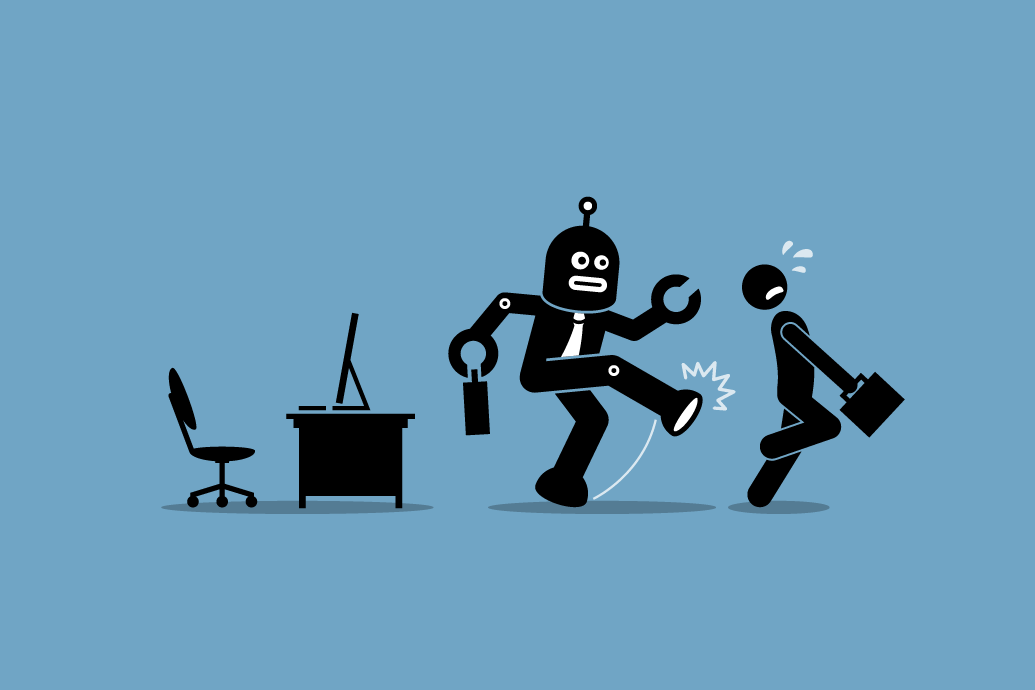When Steven Spielberg released AI back in 2001, most of us thought the day when robots would be as mainstream as smartphones was far in the future—further than we could see. If we’re talking about robots that look like Haley Joel Osmond and Jude Law, most likely they are something for the distance future. But, if we’re talking about artificial intelligence smart enough to outperform humans in complex tasks, then the future is already the present.
Download a PDF version of this post as PDF.
Robots have been creeping into a lot of industries, most obviously in manufacturing, but also in financial services, and on a surprisingly large scale. Last month, BlackRock made headlines with the announcement that it would lay off 13% of its portfolio managers–to replace them with stock-picking software.
BlackRock is the largest asset manager in the world, so when it does something, everyone pays attention. But ,apparently it is neither the first nor the only one replacing humans with computers. The financial services industry is scrambling to find ways to utilize the potential of artificial intelligence as fully as it can.
StocksToTrade—now better than ever! We ushered in the New Year with some major advancements that include 3 unique features, exclusive to our Platform.
With algo trading already old news, now some companies are trying to teach computers to replicate the most successful trades of the stars: Steven Cohen’s Point72 Asset Management is experimenting with algorithms to try and identify patterns in the legendary trader’s best trades in an attempt to then replicate them.
Late last year, reports emerged that the manager of the world’s top hedge fund, Bridgewater, is working on a secret project that would see most of the fund’s operations automated. Ray Dalio called the project “The Book of the Future” and according to the reports, aimed to boost the efficiency of Bridgewater by sending employees “GPS-style” directions for everything a fund employee does over a typical day.
The Tokyo Stock Exchange is also artificial intelligence to spot unfair trading practices and corporate accounting “irregularities.” The system will be fed data from previous unfair trades to enable it to spot the signs in the future and rate the possibility of a trade being unfair from 0 to 1.
According to the Yomiuri Shimbun, which reported the news, the adoption of AI for detecting trading fraud will reduce trade investigations by as much as 60%. With a daily number of trades on the TSE averaging 45.8 million last year, a 60% decline in investigations looks even more impressive.
Last year, AI devotee Ben Goertzel launched a fully automated hedge fund, saying “If we all die, it would keep trading.”
This might sound a little bit somber, but it’s the plain truth and bluntly illustrates the reason why the financial services industry is increasingly turning to AI: humans have limited capacity to work and perform at the top of their abilities. What’s more, these abilities are more modest than a computer’s, it seems.
Earlier this year, a team of scientists created a group of artificial intelligence algorithms and tasked them with replicating trades using past data. The algos didn’t just outperform human traders; they beat them into the ground, yielding an average annualized return rate of 73% for 1992 to 2015.
What’s particularly notable was that in two years that saw many traders lose everything because of bad choices, the algos performed exceptionally, achieving returns of 681% for 2008 and 545% for 2000, when the dotcom bubble burst. The reason: algos have no emotions to succumb to and mess up their trades.
Given these results, it’s hardly a surprise that algo trading last year accounted for 75% of all trades globally and this figure will continue to rise further in the future.
In fact, according to a recent survey from Opimas, automation in financial services will result in a 28% increase in sector players’ cost-to-income ratios by 2025, with them spending $2.8 billion in AI initiatives in 2021, up from $1.5 billion this year.
Of course, these improvements will come at the expense of human employees: Opimas estimates that by 2025 the financial services industry will reduce its overall headcount by a tenth, which means almost a quarter of a million people will have to look for a new job. Of these, computers will displace 90,000 in asset management.
Some of these might get a chance to stay, however, if Elon Musk’s latest enterprise takes off fast enough. Neuralink’s stated goal is to find ways of merging human with artificial intelligence, or to put it in more familiar terms, create a kind of cyborg species. For now, this concept only exists in science fiction but remember how we thought Spielberg’s AI was outrageously futuristic?
You demanded it, and we delivered: StocksToTrade now offers Paper Trading and a new Trading Module. Our Paper Trading platform offers our customers a safe environment to practice trading without ever having to risk a cent of their capital to the market. By leveraging the real-time data provided with our service, the paper trading simulation offers an experience as close to real trading as possible. Learn more …
